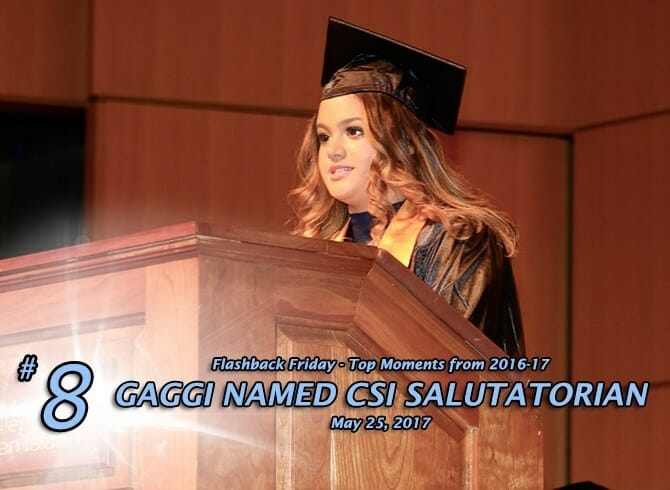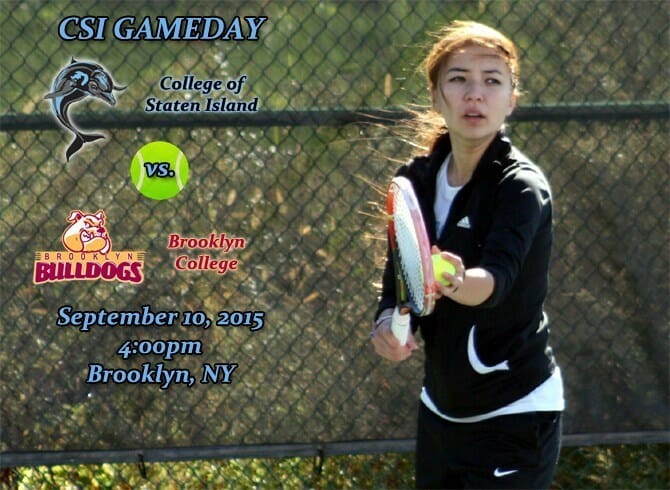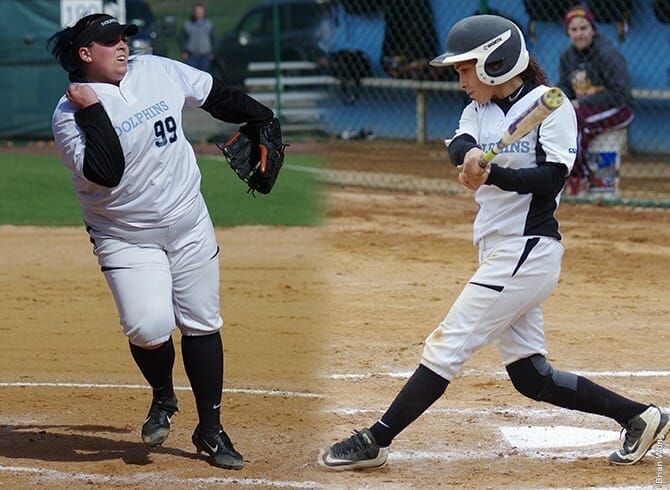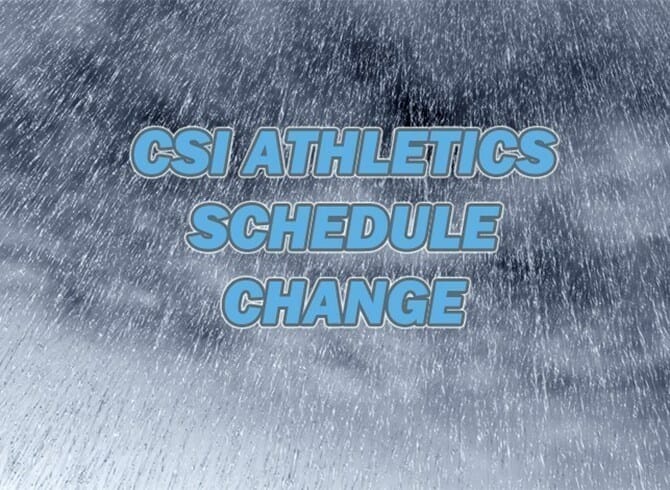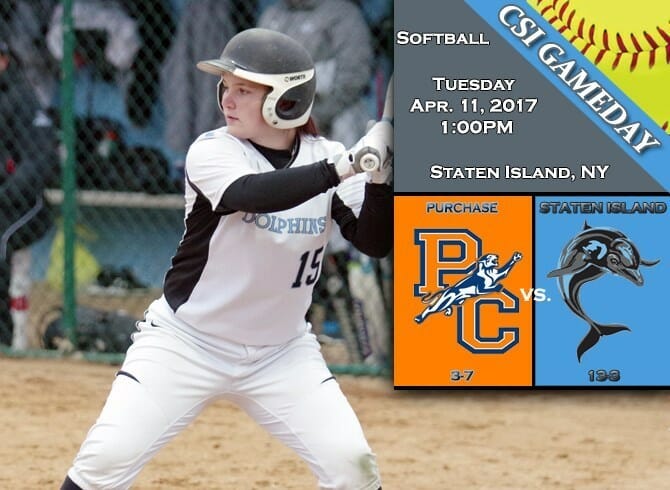Flashback Friday looks at the top moments from the 2016-17 athletic year at the College of Staten Island. This week, we take a look at the No. 8 top moment from late-May. CSI senior women’s swimming standout Naomi Gaggi became the most accomplished scholar-athlete of all-time, taking home the College’s Salutatorian honor and delivering an address at Honors Convocation.
#8 – Naomi Gaggi named CSI Salutatorian
Date: May 25, 2017
Who: Naomi Gaggi, CSI Swimming & Diving Team
Where: College of Staten Island – Staten Island, NY
What Happened: In early-May, College of Staten Island senior women’s swimming and diving standout Naomi Gaggi learned she was one of a handful of finalists for the College’s Valedictorian honor. After careful consideration and interviews, Gaggi was ultimately selected as the school’s Salutatorian, that carried with it the duty of addressing future CSI graduates at the College’s Honors Convocation on May 25, 2017, just a handful of days before Commencement. Gaggi delivered her address after remarks from campus President Dr. William J. Fritz, and was a part of exercises that honored many departmental award winners and honors degree recipients. Part of the Macaulay Honors College at CSI, Gaggi has dedicated her undergraduate studies to researching Autism and working with children on the spectrum. A Psychology major with a focus in neuroscience, Gaggi has volunteered in countless community service projects that speak to her study and her selfless giving to organizations she admires. At the close of her career, the four-time CSI record holder was named CSI’s Scholar-Athlete of the Year and was a honorable mention scholar-athlete with the City University of New York Athletic Conference. She was also a part of the Women’s Swim team that won the College’s Team GPA award and was recognized as a Scholar-Athlete All-America team by the CSCAA.
 Q&A…with Naomi Gaggi
Q&A…with Naomi Gaggi
So let’s start at the beginning. What made you choose CSI as a landing spot for you academically and athletically?
CSI offered unique research opportunities and one-to-one mentorship that stood out amongst other schools. CSI also has an abundance of classes and internship opportunities specific to neuroscience that allowed me to explore my major from a very small molecular level to a large behavioral level. The CSI athletics department is a very close-knit community that I wanted to be a part of. The swim team at CSI showed opportunities for many different types of athletes to grow as student-athletes during their time here, which allowed me to balance my academics and athletics.
You obviously take your studies very seriously. How does playing a sport, especially one that involves a lot of self-discipline like swimming, factor into that equation?
I’ve been swimming since I was very young and I owe a lot of my discipline in the classroom to the discipline I learned through the sport of swimming. Swimming has always been an equal counterpart of school work in my life. Swimming has helped me to maintain my strict schedule and prioritize my school work even though it did take up a lot of time. Without swimming, I wouldn’t be the student I have grown to be.
Your schedule involves so much outside of CSI as well, volunteering, community service, research projects – how important has it been to you to be involved in these projects, not only to round out your education, but to network as well?
I believe that experience outside of the classroom is just as important as experience inside of the classroom. What I learned in textbooks truly came to life in my experiences outside of CSI. I became a competitive student by having internships at places like Yale University, where I got to meet people at the top of my field and learn different ways of research.
It must feel good amidst the backdrop of your life to be involved in a sport and the comradery that comes with it. What are some of your top memories of your athletic career?
The athletics department at CSI has fostered my growth and encouraged me every step along the way. My best memory on the CSI Swimming and Diving Team was when I swam the 500-yard freestyle for the first time. I started out on the team as a sprint freestyler. When my coach pushed me to try something outside of my comfort zone, it was definitely intimidating, but the reward was worth the risk. I wound up changing my whole perspective of swimming and becoming a long distance swimmer. The reward of all of my hard work and the risk of trying a new event changed my whole career.
So, you ultimately get to be a finalist for the Valedictorian honor at CSI and are chosen to be the Salutatorian and speak at Honors Convocation. What does an honor like that mean to you?
It is such an incredible honor to be selected as the Salutatorian. It was such an awesome reward for all of the hard work that I put in over the past four years. It was an even greater honor to be Salutatorian and a student-athlete, which proved to myself and I hope to others that it is possible and rewarding to be involved in a sport you love and still achieve your goals academically.
You had to make an address at the Honors Convocation before a huge audience. What message do you ultimately try to convey there, what are you looking to get across to your peers when you make that speech?
It is such an honor. Something I really tried to relay in my address was the importance of well-roundedness and that anything you want can be done. I spoke highly of my experiences as a student-athlete and how this has transposed onto every aspect of my life. I hope to be an example to other students who may think it is hard to balance something you are passionate about and the heavy demands of college coursework. It can be done if you are truly passionate about it.
Obviously your educational pursuits will continue, with the hopes that you will continue to be a part of such groundbreaking work working with Autism patients and their families. At the end of the day, what will make you happy professionally, where would you like to see yourself over the next 20-30 years?
After graduate school, I definitely want to teach neurobiology at the collegiate level. I will continue with research, ideally in a hospital, to explore the neuromarkers of autism.
It’s hard to believe four years have gone so fast. You broke school records in swim, accomplished such incredible academic accolades, moving on to grad school and a distinguished career. Have you ever stopped to recognize what you have accomplished so far, and how does it make you feel?
I really thought about the last four years on the day of graduation. I was so happy with my collegiate experience and I thought about all of the late nights of studying and the early morning practices and how I wouldn’t do anything differently.
What can you say about your overall experience at CSI and how it has affected your life?
The CSI experience has changed my perspective on life in general. Through my experiences, I have become a more well-rounded and cultured individual. CSI fosters growth for many different types of students, which makes anything possible and any goal achievable.
Other Highlights
CSI Convocation Photo Album
 |
 |
 |

